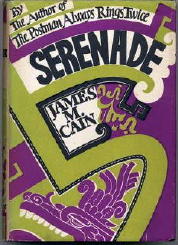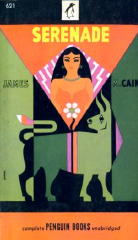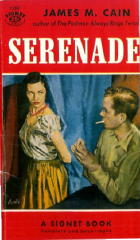Sun 31 Aug 2008
A 1001 MIDNIGHTS review: JAMES M. CAIN – Serenade.
Posted by Steve under 1001 Midnights , Authors , Reviews1 Comment

JAMES M. CAIN – Serenade. Alfred A. Knopf, hardcover, 1937. US Paperback editions include: Penguin Books #621, 1947; Signet 1153, 1954; Bantam S-3864, 1968; Vintage, 1978.
Film: 1956, with Mario Lanza and Joan Fontaine.
Though lesser known than his more famous The Postman Always Rings Twice and Double Indemnity, Serenade is equally a masterpiece. Most of Cain’s best work is of novella length, but Serenade is an exception; a wider canvas is required for this more ambitious work with its subject matter that was daring even for Cain.
The operatic undertone of Cain’s work comes to the fore here as an opera singer who loses his voice regains it by spending a night of lust and love with a Mexican whore in a deserted church during a thunderstorm.

When John Howard Sharp returns to New York City and his singing career, the healing prostitute, Juana, is at his side; but they are soon faced with a threat from the past, the man whose homosexual liaison with Sharp had caused the singer?s traumatic loss of voice. In James M. Cain, there can only be one solution to such a situation: murder.
But murder in Serenade isn’t born of greed and petty self-interest as it is in other Cain novels. The man and woman who share this sexual adventure are admirable and self-sacrificing. Their love is noble, and their tragedy is the deepest, most affecting in all of Cain.

Cain wrote Serenade and his two other masterpieces in the 1930s; but his later, lesser (if interesting) works have tended to dilute his reputation. He is easily the peer of Hammett and Chandler, however, neither of whom wrote with Cain’s unabashed passion.
Among his better later works are Past All Dishonor (1946) and The Butterfly (1947); they are, characteristically, in the first person. Mildred Pierce (1941) is the best of Cain?s third-person works. Several other completed novels are among Cain?s papers, and remain unpublished.
———
Reprinted with permission from 1001 Midnights, edited by Bill Pronzini & Marcia Muller and published by The Battered Silicon Dispatch Box, 2007. Copyright ? 1986, 2007 by the Pronzini-Muller Family Trust.
February 24th, 2022 at 9:51 pm
[…] Previously reviewed here by Max Allen Collins. The film panned here by David Vineyard. […]